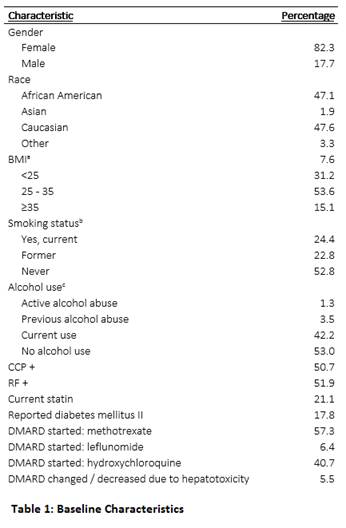Session Information
Date: Monday, October 22, 2018
Title: Rheumatoid Arthritis – Treatments Poster II: PROs, Safety and Comorbidity
Session Type: ACR Poster Session B
Session Time: 9:00AM-11:00AM
Background/Purpose: Hepatotoxicity is a common reason why DMARDs are abandoned or changed in RA. We hypothesize that features of metabolic syndrome (such as obesity, dyslipidemia, and diabetes) are risk factors for DMARD hepatotoxicity in RA.
Methods: We conducted a retrospective chart review of 361 patients with RA listed as the primary diagnosis code for ≥ 3 consecutive visits. Demographic information, BMI, lipid panel, prior alcohol use, smoking status, viral hepatitis serologies, statin use, seropositive status, and type of DMARD used were recorded at the initial visit. Patients with active hepatitis B and C were excluded from analysis. DMARD hepatotoxicity was defined as change of DMARD or dose decrease of DMARD with corresponding provider documentation of concern for hepatotoxicity. Using exact logistic regression, odds ratios for the risk factors of DMARD hepatotoxicity were calculated.
Results: Out of the 361 patients reviewed: 15.1% had BMI > 35 and 17.8% had a diagnosis of diabetes mellitus II. Table 1 has additional baseline information. 20 of 361 patients (5.5 %) had DMARD hepatotoxicity. Methotrexate (OR 3.07) and leflunomide (OR 6.11) were significantly associated with risk of DMARD hepatotoxicity. Figure 1 demonstrates the adjusted odds ratios for BMI, diabetes, and alcohol abuse as risk factors for DMARD hepatotoxicity. HDL ≤ 40 had an unadjusted OR of 2.98 (0.74 – 12; p 0.119) toward being a risk factor for DMARD hepatotoxicity. RF or anti-CCP seropositivity, statin-use, age, and sex did not demonstrate a correlation value to suggest they are risk factors.
Conclusion: Our study does suggest that several surrogates of metabolic syndrome such as BMI and diabetes mellitus are likely risk factors for development DMARD hepatotoxicity, especially with methotrexate and leflunomide. Though the study was underpowered for the statistical significance on some of these variables, clinicians should consider features of metabolic syndrome as potential risk factors for hepatotoxicity with DMARD use. Further studies need to be performed examining this relationship.
To cite this abstract in AMA style:
Nandan A, Syed H, Haritha J, Maniscalco D, Gill R, Puri P, Rodriguez V. DMARD Hepatotoxicity in Rheumatoid Arthritis and Its Association with the Surrogates of Metabolic Syndrome [abstract]. Arthritis Rheumatol. 2018; 70 (suppl 9). https://acrabstracts.org/abstract/dmard-hepatotoxicity-in-rheumatoid-arthritis-and-its-association-with-the-surrogates-of-metabolic-syndrome/. Accessed .« Back to 2018 ACR/ARHP Annual Meeting
ACR Meeting Abstracts - https://acrabstracts.org/abstract/dmard-hepatotoxicity-in-rheumatoid-arthritis-and-its-association-with-the-surrogates-of-metabolic-syndrome/


